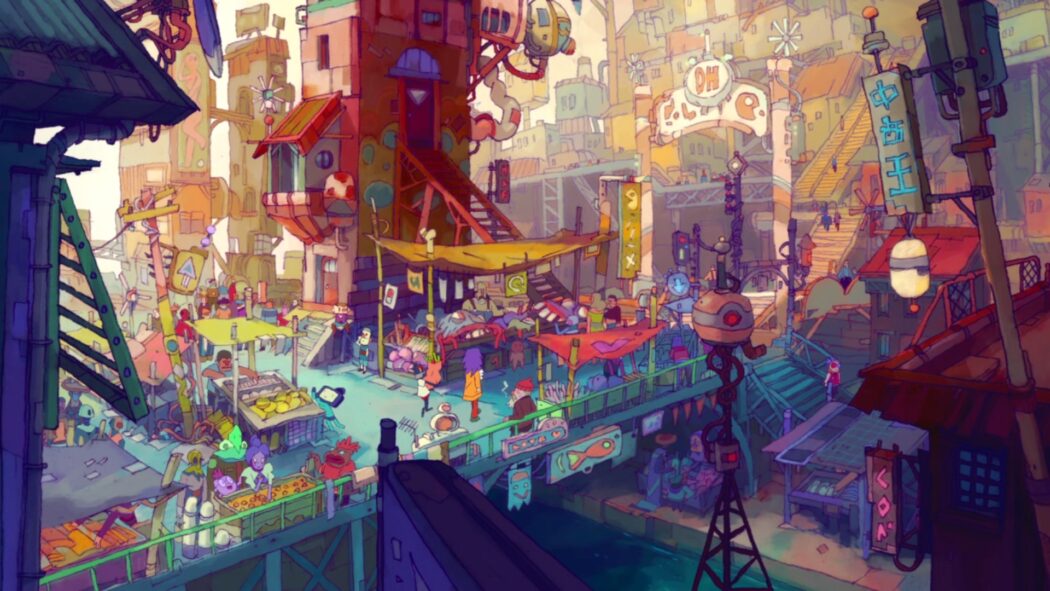Eastward Review
By now, you’ve probably heard that Eastward, the new action-adventure from Pixpil Studio in Shanghai, follows in the hallowed steps of The Legend of Zelda and cult game EarthBound (aka Mother 2). You’ll find no mind-melting mechanical or narrative reinventions here, but a meticulously-made, lovingly detailed game that is, quite simply, a real joy to play.
Playing as silent beardo John and his sort-of-foster kid Sam, you’re unceremoniously booted out of a poor, subterranean mining outpost into the unknown world above. Eastward hits all the right notes with a winning combo of sci-fi, mystery, and good old-fashioned interpersonal drama that fuels the smalltown settings where John and Sam pass through. There’s a nice balance between blessedly short cutscenes and action sections that follow a tried-and-tested Zelda formula: complete missions for NPCs, upgrade weapons and special abilities, and amass more hearts.
Most of the time, combat involves going ham with John’s frying pan—the default starting weapon that he also uses to make dinner for Sam and eventually with Sam’s energy-based abilities that help with puzzles (but honestly aren’t often required). These aren’t tough; think triggering weighted blocks, dragging and rearranging obstacles, and occasional sequences where John and Sam are separated and must use their respective abilities to help each other through the level. Nothing about combat is particularly difficult, but depending on your propensity for brute-force button-mashing, certain fight mechanics related to timing or positioning can be challenging. The escape gauntlet from Greenberg, for instance, isn’t especially tough, but a matter of nailing a good rhythmic pace as you evade the encroaching miasma.
Hack, slash and more

Eastward is generous beyond the average hack-and-slash dungeon experience—there are a whole bunch of mini-games, including a slot-machine mechanic for John’s cooking skill and a turn-based 8-bit RPG called Earth Born (hello, EarthBound) that’s clearly a widespread classic. As a game-within-a-game, Earth Born’s gacha-like system with collectible “Pixballs” sheds some light on the economy of the world—Sam is initially too poor to play because she doesn’t have her own memory card, and over time, collects enough tokens to buy Pixballs that help in battle. Little bits of flavour text, for the most part, add texture to a world already brimming over with visual details—my favourites were the rambling snippets of dialogue from each fridge which acts as a save point.
Sam’s infectious enthusiasm often bubbles to the surface with equal doses of naivete (she is, after all, a kid) which played well off my occasional frustration with the game’s wide-eyed approach to altruism. Perhaps if I hadn’t started playing Eastward at a particularly trying time in my life, I’d actually take a page or two from all of this blunt-force positivity. There’s a fair bit of painfully earnest, hackneyed dialogue that more often than not dribbles off into tedium, and some questionable characterisation choices that, in retrospect, I’d cautiously put down to cultural humor; the treatment of Greenberg’s top bachelorette Uva, in particular, seems like a vestige of outdated but “well-meaning” Chinese traditions that deepen generational divides between real-life communities. The small brothel subplot of the game in New Dam City aspired to big Stephen Chow energy—a slapstick approach that fell somewhat flat in execution, as did the vehemently man-hating stereotype of John and Sam’s neighbor in Potcrock Isle.
Familiar grounds

There are quite a few fetch quests that ping-pong across the map. Occasionally the game throws you a bone and cuts to a fast-travel sequence, but the environments are generally so beautifully rendered and animated that I didn’t mind the extra walking. Long-windedness aside, Eastward is full of heart, exuding the kind of emotional authenticity that can momentarily transport you back to the best memories of your favourite childhood RPG. I’m not the first to admire its gorgeous artwork and amazing chiptune score (composed by Joel Corelitz, who also worked on Death Stranding, Gorogoa, and Halo Infinite) and I won’t be the last—the latter is like mainlining nostalgia-laced serotonin straight to the brain.
Perhaps Eastward’s greatest strength is that it isn’t complicated—gameplay is at once deeply warm and familiar without fading into stale territory, which is surprisingly tricky for a game that presents itself as a spiritual successor to the Zelda legacy. Eastward in motion is an unstoppable force, an exquisitely-animated homage to old-school RPGs that more than compensates for its writing and narrative.

